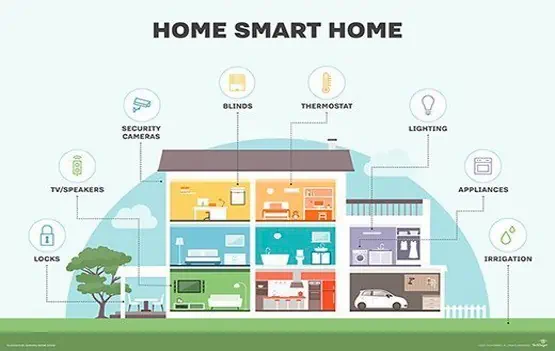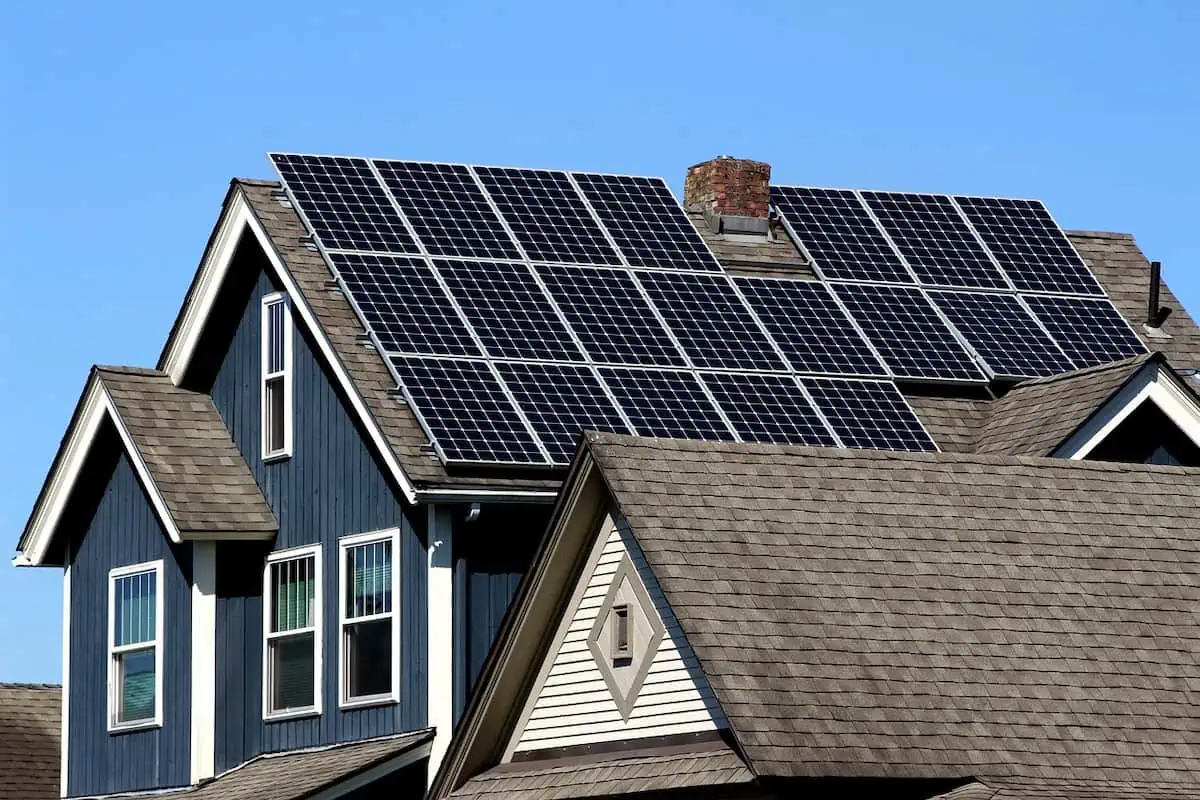The popularity of smart homes is constantly growing. After all, it is very convenient and economically beneficial in the long run. Such a house has a lot of advantages, as well as the second very important and energy-efficient attribute – solar panels.
These two technologies are designed to simplify people’s life and save them a considerable amount. Energy-smart homes are a novelty that will stay with us forever.
National Association of Realtors surveys reveal that 70% of their clients are looking for environmentally friendly and efficient homes. After all, they can give a complete sense of security, wherever their owners are, the comfort of stay and control, automation of processes, tremendous energy efficiency, and general peace of mind.
This is the year of green energy. Let’s take a closer look at the smart home combined with solar systems and see how they manage to improve human life.
What Is a Smart Home?

A smart home is a general concept that involves the automation of the entire house or some of its components. For example, various devices and systems in a home are interconnected to improve the comfort, safety, energy efficiency, and convenience of the residents. Internet-of-Things (IoT), sensors, smart assistants, automation systems, and other technologies are utilized in smart homes.
All this is aimed at providing control and easy management of various home systems. Residential solar panels have become one of the popular additions to the smart home concept. Their combination gives maximum efficiency and productivity to the owners.
Another advantage of house adaptation to this concept is the ability to constantly integrate new technology features. All aspects are constantly being improved, and life becomes even easier.
The main task in organizing a smart home is to do everything correctly, according to the standards and compatibility of components. Only then it will be possible to achieve the desired result.
Features of Using Solar Panels in a Smart Home
The use of solar energy in a smart home fits perfectly into the overall concept. After all, its goal is to achieve energy savings, efficiency, and automation. A smart plug is absolutely a great attribute of an energy-efficient home. But with solar energy, everything will be much more interesting.
So, no matter how smart a house is, it needs power to perform its functions. There are two options for getting it. The first is from a classic power plant that uses a huge amount of minerals to keep it running and distributing electricity, leaving a huge carbon footprint. The second is from renewable energy sources, in particular from solar panels.
The latter is your device, which you can fully control. You can rent it or get the energy of the sun already in its finished form from a farm or other ‘solar companies near me’ that deal with it. Just make a choice.
Solar energy is free, environmentally friendly, and inexhaustible. On the other hand solar panels cost a lot of money, but they pay off quickly enough, especially in combination with a smart home. In addition, they still have a carbon footprint, albeit a small one, and their guaranteed service life is 20-25 years.
If you decide to install smart home solar calls and supplement them with a battery storage system, the payback will accelerate and efficiency will increase significantly. After all, a smart home is already reducing the amount of energy consumed. When you have excess solar energy, it will accumulate in the battery and be used when the time comes.
You can also immediately reconnect some of the devices and systems to the battery, thereby reducing the overall load. All this can be adjusted by constantly reconnecting all the components.
But do not forget about the risks of failure or emergency. It is better to save some excess solar energy for later usage.
As a result, you have free energy that you control and regulate, which automatically increases efficiency and leads to automation. This is what is Solar Smart Living.
Let’s look at an example of how the efficiency of solar panels combined with a smart home is manifested. You need a “free” laundry. Your machine is not capable of providing this on its own. But if there is the automation of a smart home – configure everything so that the washing machine turns on by itself when it is sunny outside and the panels receive sunlight.
You can also redirect the operation of the device to the battery. For example, to start washing when the battery has more than a certain level of energy.
Benefits of Solar Smart Homes
The combination of a smart home with a solar system allows the use of solar energy to automate and optimize energy consumption in the home. Their tandem provides several important advantages:
| Renewable energy | Solar-powered smart homes use clean and renewable solar energy, which reduces dependence on fossil fuels and contributes to a greener environment. They help reduce the carbon footprint and fight climate change. |
| Long-term investment | Installing solar panels and building a smart home system can be a long-term investment. Over time, the cost of the system may be recovered through energy savings and potential incentives or tax credits offered for renewable energy installations. |
| Increased Efficiency | Smart home automation and energy management systems optimize energy consumption by monitoring appliances and devices based on real-time data. This results in improved energy efficiency, reduced waste, and lower overall energy consumption. |
| Energy storage | Smart homes often include energy storage systems such as batteries to store excess solar energy generated during the day. In periods of low solar power, like at night or on cloudy days, this stored energy can provide continuous electricity. |
And these are just the main advantages of switching to solar smart living.
How Solar Panels Increase Energy Efficiency and Automation in the Smart Home
Solar panels increase energy efficiency and smart home automation in several ways:
- Reducing dependence on the grid: Installing solar panels allows the smart home to generate its electricity. This reduces reliance on the traditional electrical grid and allows the use of clean and renewable solar energy.
- Savings on energy bills: Generating electricity with solar panels significantly decreases, and sometimes even eliminates energy costs. Intelligently using smart home solar savings to power all electrical appliances and systems in the home, resulting in significant economic benefits for owners.
- Automatic energy management: Solar panels combined with smart control systems allow you to automatically control the use of electricity in a smart home. For example, the system can optimize the operation of electrical appliances, their operation schedule, and energy-saving modes depending on the availability of solar energy and current energy consumption.
- Load management: Smart home systems can manage loads based on solar energy production. For example, high-power consumption devices such as air conditioners or electric cars can be started when solar panels generate enough power. This helps to maximize the use of solar energy and reduce consumption from the grid.
- Monitoring and analysis of energy consumption: Smart home systems allow you to monitor and analyze energy consumption in real-time. It shows how much energy is used and generated, and which device consumes the most power. By optimizing energy consumption and improving home efficiency, you will be able to optimize your energy bill.
In addition to the size of the solar installation, power consumption patterns, and local electricity tariffs, a solar-powered smart home will also be cost-efficient if its systems are highly efficient. Consulting with solar experts and doing a cost analysis specific to your situation can provide a clearer picture of the potential savings and other benefits.
Conclusion
Integrated solar homes combine two main areas of modern technology: renewable energy and home automation. These are the two most important components of stopping global warming and comfortable human life. Using them more often will make everything easier.
We hope you have no doubts that solar panels increase the efficiency and automation of a smart home. Combine these two technologies today.

